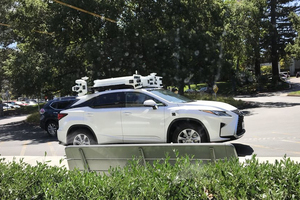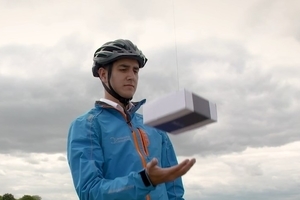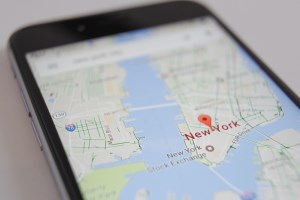Waymo's CEO says self-driving cars are 'really close' to being ready for the road
 California — California's Central Valley is known for its miles and miles of farm orchards, fights over water rights, and, these days, high unemployment. High-tech? Not so much.
California — California's Central Valley is known for its miles and miles of farm orchards, fights over water rights, and, these days, high unemployment. High-tech? Not so much.
But I was here on Monday to see in action a cutting-edge technology that has the potential to greatly reshape our economy and society — the self-driving car. Waymo, Google's autonomous vehicle spinoff, has its testing facility at a decommissioned Air Force base. The company invited several dozen reporters to see its cars in action, get a ride in one, and hear its case that its technology is all-but ready for the real world.
Read moreHow to turn your watch, shoes, or household junk into a password
 One day, your household items and accessories could become a new way to authenticate yourself online, according to researchers. Many websites and online services are now enforcing or at least offering two-factor authentication (2FA) as a way to enhance the security of your accounts.
One day, your household items and accessories could become a new way to authenticate yourself online, according to researchers. Many websites and online services are now enforcing or at least offering two-factor authentication (2FA) as a way to enhance the security of your accounts.
We all know passwords are less than ideal these days, being susceptible to brute-force hacking as many of us use simple, repetitive phrases -- not to mention the flood of data leaks taking place every day -- and so other methods are now needed. Two-factor authentication utilizes a second method of verification to check someone's identity.
Read more'It's able to create knowledge itself': Google unveils AI that learns on its own
 Google’s artificial intelligence group, DeepMind, has unveiled the latest incarnation of its Go-playing program, AlphaGo – an AI so powerful that it derived thousands of years of human knowledge of the game before inventing better moves of its own, all in the space of three days.
Google’s artificial intelligence group, DeepMind, has unveiled the latest incarnation of its Go-playing program, AlphaGo – an AI so powerful that it derived thousands of years of human knowledge of the game before inventing better moves of its own, all in the space of three days.
Named AlphaGo Zero, the AI program has been hailed as a major advance because it mastered the ancient Chinese board game from scratch, and with no human help beyond being told the rules. In games against the 2015 version, which famously beat Lee Sedol, the South Korean grandmaster, in the following year, AlphaGo Zero won 100 to 0. The feat marks a milestone on the road to general-purpose AIs.
Read moreIt takes just $1,000 to track someone's location with mobile ads
 When you consider the nagging privacy risks of online advertising, you may find comfort in the thought of a vast, abstract company like Pepsi or Nike viewing you as just one data point among millions. What, after all, do you have to hide from Pepsi?
When you consider the nagging privacy risks of online advertising, you may find comfort in the thought of a vast, abstract company like Pepsi or Nike viewing you as just one data point among millions. What, after all, do you have to hide from Pepsi?
And why should that corporate megalith care about your secrets out of countless potential Pepsi drinkers? But an upcoming study has dissipated that delusion. It shows that ad-targeting can not only track you at the personal, individual level but also that it doesn't take a corporation's resources to seize upon that surveillance tool—just time, determination, and about a thousand dollars.
Read moreHere’s a closer look at Apple’s secret self-driving car
 A new video of what would appear to be one of Apple’s “Project Titan” self-driving cars was posted to Twitter last night, and it looks much different than it did the last time we saw it. The car appears to be outfitted with standard third-party sensors and hardware, including (count ‘em) six Velodyne-made LIDAR sensors, several radar units, and a number of cameras — all encased in Apple-esque white plastic.
A new video of what would appear to be one of Apple’s “Project Titan” self-driving cars was posted to Twitter last night, and it looks much different than it did the last time we saw it. The car appears to be outfitted with standard third-party sensors and hardware, including (count ‘em) six Velodyne-made LIDAR sensors, several radar units, and a number of cameras — all encased in Apple-esque white plastic.
The video was captured by someone who knows his stuff about autonomous vehicles: MacCallister Higgins, co-founder of self-driving startup Voyage (that just launched its own pilot ride-hailing project in a San Jose retirement community).
Read moreSecurity aspects of Apple’s Face ID technology
 This month the iPhone changed in some big ways. Probably the most obvious is the missing “Home” button. That’s right: Apple’s newest flagship smartphone, the iPhone X, has no fingerprint scanner. It’s been replaced by something called Face ID.
This month the iPhone changed in some big ways. Probably the most obvious is the missing “Home” button. That’s right: Apple’s newest flagship smartphone, the iPhone X, has no fingerprint scanner. It’s been replaced by something called Face ID.
Those who watched Apple’s presentation will already be somewhat familiar with Face ID, but we’ll shed some light on this technology, and then turn to the area that’s always on our minds: security. In brief, Apple’s Face ID is a technology used to recognize a user’s face and unlock the new iPhone as well as confirm payments by comparing its view of their face with a picture stored in the iPhone’s memory.
Read moreDelivAir uses drones to deliver to people, not physical addresses
 Drone deliveries have been in the pipeline for some time, and while Amazon is pioneering the cause, (although Rival 7-Eleven has completed nearly 100 aerial deliveries to date), its model is still somewhat encumbered by factors at odds with the advantages drone delivery technically offers.
Drone deliveries have been in the pipeline for some time, and while Amazon is pioneering the cause, (although Rival 7-Eleven has completed nearly 100 aerial deliveries to date), its model is still somewhat encumbered by factors at odds with the advantages drone delivery technically offers.
Recipients need to be present at an address, for example. Cambridge Consultants -- the team that brought us intelligent bins and Renaissance doodling -- has developed a drone delivery system that'll get you your stuff anytime in a matter of minutes. Let's imagine you're out having a nice walk in the middle of the countryside when you start feeling peckish.
Read moreCyberattack to cause power disruption within five years, utility execs fear
 Three-quarters of North American utility executives believe there is at least a moderate chance that the electrical grid in their nation will be interrupted by a cyberattack sometime in the next five years.
Three-quarters of North American utility executives believe there is at least a moderate chance that the electrical grid in their nation will be interrupted by a cyberattack sometime in the next five years.
A worldwide study by Accenture of 100 power utility executives from 20 countries found that 63 percent believe there is a moderate likelihood a cyberattack would cause power interruptions with this figure increasing to 76 percent among North American executives. When it comes to what those surveyed most fear it is an attack that causes injury to customers or employees, while almost as many, worry about sensitive customer or employee data being stolen.
Read moreBroadcom announces "superaccurate" GPS chip coming in 2018
 Tired of your Lyft driver not knowing exactly where you are? A new extremely accurate GPS chip could help solve that problem — all while consuming half the power of current chips.
Tired of your Lyft driver not knowing exactly where you are? A new extremely accurate GPS chip could help solve that problem — all while consuming half the power of current chips.
Broadcom's BCM47755 chip will allow smartphones to be accurate within 30 centimeters, the company said at a conference in Portland. That's compared to the current standard of 3 to 5 meters, the company said. Broadcom also said the BCM47755 would be more effective in cities than older chips. All of this would make them very useful for location-based apps. For example, lane-level knowledge of the vehicle's location vastly improves the turn-by-turn navigation performance.
Read moreLine, BlackBerry messengers can be unlocked in Russia
 Line and BlackBerry messengers can be unlocked in Russia, head of the Russian communications and mass media watchdog Roskomnadzor Alexander Zharov told.
Line and BlackBerry messengers can be unlocked in Russia, head of the Russian communications and mass media watchdog Roskomnadzor Alexander Zharov told.
"We are blocking Zello, BlackBerry, Line and WeChat for the time being," the official said. "Colleagues from Line visited us. This Japanese messenger requested to send requirements once again. We did so. Grounds exist to believe that their blocking will be released because they intend to abide by this law, as far as I understand from the outcome of talks," Zharov said. Representatives of BlackBerry will come to Russia in October for a meeting with the management of Roskomnadzor, Zharov said.
Read moreAxarhöfði 14,
110 Reykjavik, Iceland















